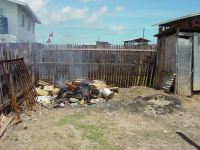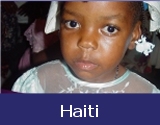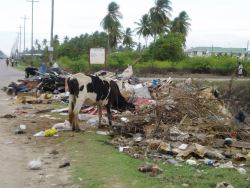 |
Contact usUnited Caribbean TrustUCT Guyana visitGuyana schoolsWomen's NGOsCitizens Initiative
Adopt a family |
home >> caribbean
>> guyana>>
 CDC Emergency Clean-Up Operations: A Lost Opportunity
 Removing
flood-damaged solid waste from the districts is more than a matter of picking
up what residents place on the streets. The first step at the community
level is to ensure residents remove all such materials from their homes
and yards. A measure of community mobilizing is essential to remind residents
of the danger of keeping contaminated materials lying around premises and
to urge them to get it all out. This operation needs to be harmonized with
availability of removal trucks and other equipment such as back-hoes, The
same applies to contaminated goods in public places – schools, health
centres, community halls and markets. Removing
flood-damaged solid waste from the districts is more than a matter of picking
up what residents place on the streets. The first step at the community
level is to ensure residents remove all such materials from their homes
and yards. A measure of community mobilizing is essential to remind residents
of the danger of keeping contaminated materials lying around premises and
to urge them to get it all out. This operation needs to be harmonized with
availability of removal trucks and other equipment such as back-hoes, The
same applies to contaminated goods in public places – schools, health
centres, community halls and markets.
As demonstrated in the Plaisance-Industry area and elsewhere, effective community mobilizing produces huge volumes of solid waste. Part of citizens’ frustration is that the official response to date has been to have contractors patrol the two major highways, which is limited to collecting waste which can be brought there. The new emergency response has trucks entering villages but pays no attention to synchronizing their visits with clean-up efforts in the community. Having trucks drift around the East Coast without a schedule known to communities is a waste of time and money. Slavish adoption of proposals mooted by the President or other politicians by the agencies involved, without pointing out relevant technical considerations is irresponsible. The proposal to create one acre plots in each NDC for garbage disposal dumps to dispose of contaminated flood-damaged waste is one such instance. Technical personnel in the Ministry of Local Government, the CDC and technical agencies – both local and inter-governmental, as well as waste disposal contractors - are aware that the term ‘dumps’ with all its connotations of unregulated, careless ‘just get rid of it’ approaches to waste is obsolete and a major contributor to the repulsive pre-flood garbage-choked environment of the East Coast. The Director of Solid Waste management of the Georgetown M&CC has stated repeatedly throughout this crisis that the only safe place to dispose of flood damaged waste – despite all its problems - is the Mandela Landfill Site. Why are East Coast communities being exposed to long-term environmental health hazards to ensure the appearance of a clean-up ? The emergency clean-up campaign is to be conducted through the NDCs. While the GCI believes involvement of the NDCs in the post-flood relief response will contribute to rehabilitating them, there is no evidence they have the capacity to address emergencies. If this were the case, why have they been so marginal to all phases of the relief effort to date. An important distinction should be made between encouraging community involvement and having NDCs direct it. Apart from the negative attitudes to these undemocratic bodies – which range from disdain to downright hostility, as witnessed by the President himself in Foulis – they presently lack the capacity to play the lead role in an emergency clean-up. The GCI believes an opportunity is being lost to empower communities to undertake an effective clean-up operation, thereby laying the foundation for introducing more sustainable systems of sanitation in the future. All phases of health and sanitation need to be addressed according to clear and well-established standards of public health, sanitation and the environment. It is not only a question of removing eyesores. The opportunity lies in several factors. The flood brought home in a new way health concerns related to garbage, blocked drains and contaminated goods. Donor agencies are on the ground and willing to support community-led clean-up efforts. Most importantly, communities are willing to be mobilized to get rid of flood-damaged goods. All of this provides excellent preparation for creating new, higher environmental standards. Placed in this context, we are addressing one problem in several phases – clean houses and yards, remove flood-spoiled goods from the districts and introduce new systems of solid waste management. The CDC response to an appeal for such an approach was that we are involved with an emergency, sustainable systems will have to wait. This short-sighted approach contributes nothing either to an effective and thorough cleansing of communities at present, nor to their future welfare. Come April-May with a distinct possibility of more floods, we face a repetition of encountering drains chocked with domestic garbage, dysfunctional NDCs and the addition of local dump sites to be re-dispersed over the communities. February 25 2005 |

 


|
| Copyright © 2022 www.UnitedCaribbean.com. All rights reserved. Disclaimer Click to Contact us |
 The
Guyana Citizens Initiative shares the concern of President Jagdeo over
the slow pace of the post-flood clean-up on the East Coast and welcomes
his intervention. The displeasure of citizens that great mounds of garbage
can still be found in villages over most of the affected areas is entirely
justified. Animals and further rains risk much of this waste finding its
way back into trenches and drains. However, the GCI is disappointed at
the wooden reaction of the Civil Defense Commission to the Presidential
expressions of concern rather than seize them as an opportunity to promote
sustainable solutions to East Coast sanitation problems..
The
Guyana Citizens Initiative shares the concern of President Jagdeo over
the slow pace of the post-flood clean-up on the East Coast and welcomes
his intervention. The displeasure of citizens that great mounds of garbage
can still be found in villages over most of the affected areas is entirely
justified. Animals and further rains risk much of this waste finding its
way back into trenches and drains. However, the GCI is disappointed at
the wooden reaction of the Civil Defense Commission to the Presidential
expressions of concern rather than seize them as an opportunity to promote
sustainable solutions to East Coast sanitation problems..